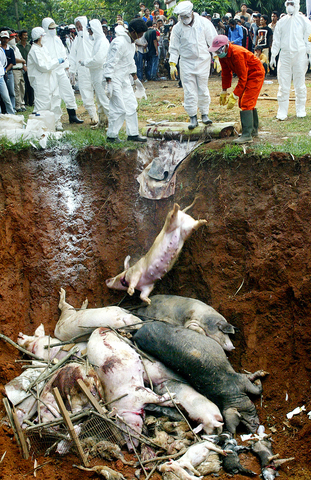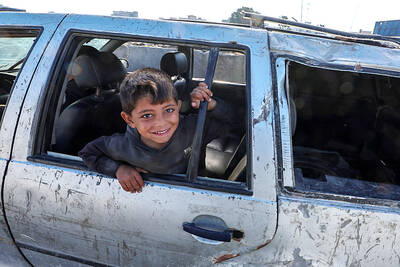When government workers in white anti-contamination suits descended on Ceng Kim's farm to slaughter his pigs, claiming they were infected with the bird flu virus that killed three people nearby, he hid inside his house.
He couldn't bear to watch, but the rest of Indonesia saw the dramatic images on television that night: Squealing pigs electrocuted one by one and tossed into a fire.
"My pigs didn't kill anyone," said Kim. "But if the government says they're sick, what can I do?"

PHOTO: AP
Pig farmers are not the only ones scratching their heads -- international experts are bewildered as well.
They say there is no evidence pigs have been infected with avian flu, despite the government's insistence that the animals are contributing to the recent outbreak in Indonesia, the world's most populous Islamic country.
Critics say the government is going after pigs because they are an easy target and may divert attention away from fears about the infection in poultry, a staple food for millions of people throughout the country.
Many Muslims consider pigs to be unclean, though pork is regularly eaten by the country's large ethnic Chinese minority, a group that frequently faces discrimination and abuse.
Indonesia is the only country to be culling swine in its fight against bird flu, which has swept through poultry populations in Asia since 2003, killing or forcing the slaughter of hundreds of millions of ducks and chickens. Sixty people have died, mostly Thailand and Vietnam, which announced its latest two deaths on Friday.
Indonesia's first deaths were earlier this month -- a 38-year-old auditor and his two young daughters who lived on the outskirts of the Indonesian capital, Jakarta.
The government initially said the victims had no known contact with birds, and that the closest source of infection appeared to be Ceng Kim's pigs, 15km away. Later, traces of the virus were found in chicken droppings in the family's own backyard.
Though an Indonesian scientist claimed in May he discovered the H5N1 strain of bird flu in pigs, the UN Food and Agricultural Organization says it has no evidence that swine have been infected -- in Indonesia or anywhere else.
The "focus should be on chickens and ducks," said FAO veterinarian Juan Lubroth.
Trisatya Putri Naipospos, Indonesia's top veterinarian, agreed and accused the government of playing "politics" with pig farmers, the majority of whom are ethnic Chinese.
At the same time, many Muslim Indonesians are happy to see ministers appearing on television saying pigs are dirty.
The Agriculture Ministry defended ongoing pig culls, saying they are part of a multi-pronged approach to eradicating bird flu and are in "no way influenced by politics, religion or race." More than 9 million chickens and ducks also have been killed since 2003, it noted.
But Indonesia's larger strategy is not always clear, even to itself.
Days after Agriculture Minister Anton Apriyantono vowed to carry out mass culls in bird flu-affected areas, he changed his mind, saying only sick animals would be killed.
He blamed a lack of money, saying the government could not afford to compensate farmers for their loss. It's the same argument made 18 months ago when bird flu first surfaced, though no request has been made to Parliament for emergency funds.

MONEY GRAB: People were rushing to collect bills scattered on the ground after the plane transporting money crashed, which an official said hindered rescue efforts A cargo plane carrying money on Friday crashed near Bolivia’s capital, damaging about a dozen vehicles on highway, scattering bills on the ground and leaving at least 15 people dead and others injured, an official said. Bolivian Minister of Defense Marcelo Salinas said the Hercules C-130 plane was transporting newly printed Bolivian currency when it “landed and veered off the runway” at an airport in El Alto, a city adjacent to La Paz, before ending up in a nearby field. Firefighters managed to put out the flames that engulfed the aircraft. Fire chief Pavel Tovar said at least 15 people died, but

LIKE FATHER, LIKE DAUGHTER: By showing Ju-ae’s ability to handle a weapon, the photos ‘suggest she is indeed receiving training as a successor,’ an academic said North Korea on Saturday released a rare image of leader Kim Jong-un’s teenage daughter firing a rifle at a shooting range, adding to speculation that she is being groomed as his successor. Kim’s daughter, Ju-ae, has long been seen as the next in line to rule the secretive, nuclear-armed state, and took part in a string of recent high-profile outings, including last week’s military parade marking the closing stages of North Korea’s key party congress. Pyongyang’s official Korean Central News Agency (KCNA) released a photo of Ju-ae shooting a rifle at an outdoor shooting range, peering through a rifle scope

South Korea would soon no longer be one of the few countries where Google Maps does not work properly, after its security-conscious government reversed a two-decade stance to approve the export of high-precision map data to overseas servers. The approval was made “on the condition that strict security requirements are met,” the South Korean Ministry of Land, Infrastructure and Transport said. Those conditions include blurring military and other sensitive security-related facilities, as well as restricting longitude and latitude coordinates for South Korean territory on products such as Google Maps and Google Earth, it said. The decision is expected to hurt Naver and Kakao

Gaza is rapidly running out of its limited fuel supply and stocks of food staples might become tight, officials said, after Israel blocked the entry of fuel and goods into the war-shattered territory, citing fighting with Iran. The Israeli military closed all Gaza border crossings on Saturday after announcing airstrikes on Iran carried out jointly with the US. Israeli authorities late on Monday night said that they would reopen the Kerem Shalom crossing from Israel to Gaza yesterday, for “gradual entry of humanitarian aid” into the strip, without saying how much. Israeli authorities previously said the crossings could not be operated safely during